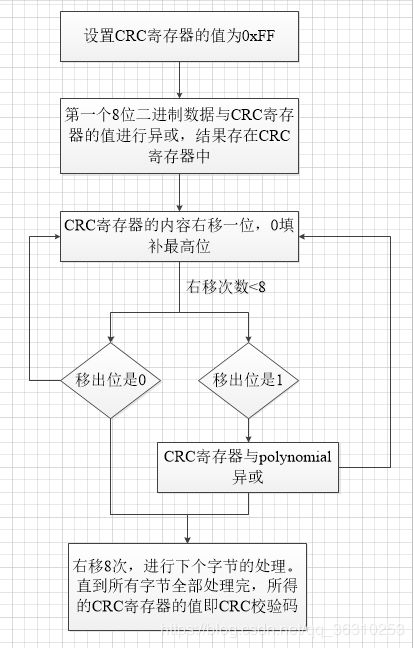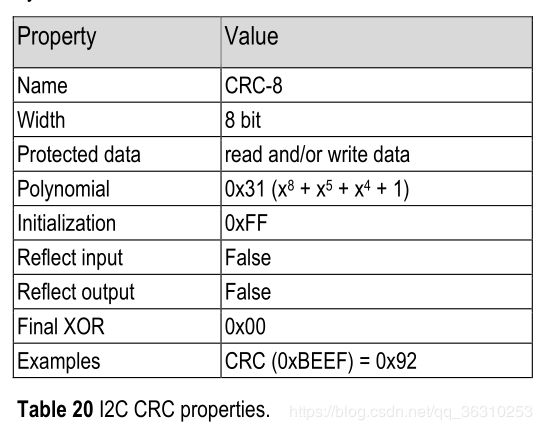CRC校验——以SHT30温湿度传感器为例(内附SHT30的驱动代码)
文章目录
- 1. 基本原理
- 2. 计算方法
- 3. c语言代码实现
- 4. SHT30代码
- 4.1 drv.c
- 4.2 test.c
- 4.3 Makefile
1. 基本原理
循环冗余校验码(CRC)的基本原理是:在K位信息码后再拼接R位的校验码,整个编码长度为N位,因此,这种编码又叫(N,K)码。对于一个给定的(N,K)码,可以证明存在一个最高次幂为N-K=R的多项式G(x)。根据G(x)可以生成K位信息的校验码,而G(x)叫做这个CRC码的生成多项式。
2. 计算方法
1. 预置一个值为0xFFFF的16位寄存器,此寄存器为CRC寄存器
2. 把第一个8位二进制数与16位的CRC寄存器相异或,异或的结果存在CRC寄存器中
3. CRC寄存器的内容右移一位,用0填补最高位,并检测移出位是0还是1
4. 如果移出位是0,则重复步骤3
如果移出位是1,则与多项式进行异或
5. 重复步骤3、4,直到右移8位,这样整个8位数据都进行了处理
6. 重复步骤2~5,进行下一个字节的处理
7. 最后得到的CRC寄存器的内容即为CRC校验码

3. c语言代码实现
以SHT30温湿度传感器为例,对CRC校验的过程进行代码实现,其中SHT30 CRC检验的相关信息如下图。从图中可以看出:该传感器采用的是CRC8校验,多项式位x8+x5+x4+1,对应的代码为1 0011 0001
而CRC校验码的位数=多项式的位数-1
多项式位数=最高次幂+1
所以得到CRC多项式校验码是0x31,手册中还给到了一个示例,数据是0xBEEF时,生成的校验码是0x92,

以下是crc8的代码实现,对于crc16,crc32或者其他多项式的校验,只需要更改代码9行和10行的初始值即可。
#include 4. SHT30代码
SHT30传感器芯片手册连接
4.1 drv.c
#include 4.2 test.c
#include 4.3 Makefile
KERNELDIR ?= /home/linux/ti-processor-sdk-linux-am335x-evm-05.02.00.10/board-support/linux-4.14.79/
PWD := $(shell pwd)
all:
make ARCH=arm CROSS_COMPILE=arm-linux-gnueabihf- -C $(KERNELDIR) M=$(PWD) modules
arm-linux-gnueabihf-gcc test.c -o app
install:
sudo cp *.ko app /tftpboot
make ARCH=arm CROSS_COMPILE=arm-linux-gnueabihf- -C $(KERNELDIR) M=$(PWD) clean
rm app
clean:
make ARCH=arm CROSS_COMPILE=arm-linux-gnueabihf- -C $(KERNELDIR) M=$(PWD) clean
rm app
obj-m += drv.o